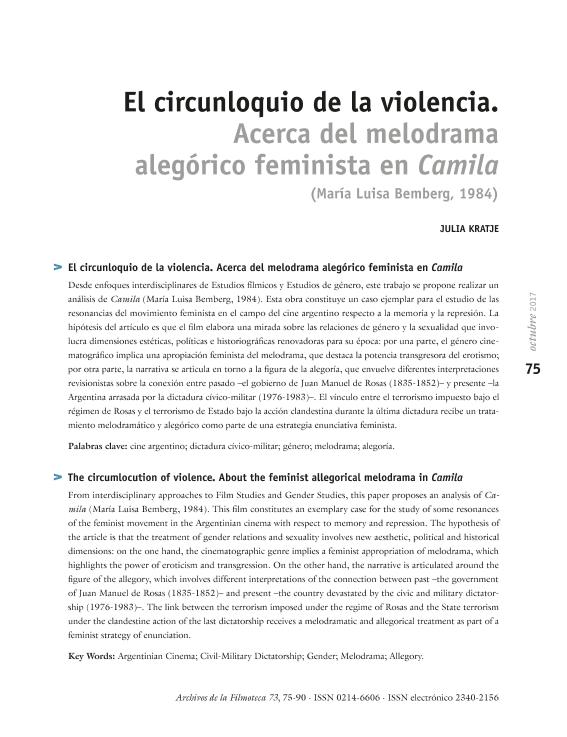Mostrar el registro sencillo del ítem
dc.contributor.author
Kratje, Julia

dc.date.available
2019-04-25T22:25:17Z
dc.date.issued
2017-10
dc.identifier.citation
Kratje, Julia; El circunloquio de la violencia: Acerca del melodrama alegórico feminista en Camila (María Luisa Bemberg, 1984); Instituto Valenciano de la Cinematografía Ricardo Muñoz Suay; Archivos de la Filmoteca; 73; 10-2017; 75-89
dc.identifier.issn
0214-6606
dc.identifier.uri
http://hdl.handle.net/11336/75046
dc.description.abstract
Desde enfoques interdisciplinares de Estudios fílmicos y Estudios de género, este trabajo se propone realizar un análisis de Camila (María Luisa Bemberg, 1984). Esta obra constituye un caso ejemplar para el estudio de las resonancias del movimiento feminista en el campo del cine argentino respecto a la memoria y la represión. La hipótesis del artículo es que el film elabora una mirada sobre las relaciones de género y la sexualidad que involucra dimensiones estéticas, políticas e historiográficas renovadoras para su época: por una parte, el género cinematográfico implica una apropiación feminista del melodrama, que destaca la potencia transgresora del erotismo; por otra parte, la narrativa se articula en torno a la figura de la alegoría, que envuelve diferentes interpretaciones revisionistas sobre la conexión entre pasado, el gobierno de Juan Manuel de Rosas (1835-1852), y presente, la Argentina arrasada por la dictadura cívico-militar (1976-1983). El vínculo entre el terrorismo impuesto bajo el régimen de Rosas y el terrorismo de Estado bajo la acción clandestina durante la última dictadura recibe un tratamiento melodramático y alegórico como parte de una estrategia enunciativa feminista.
dc.description.abstract
From interdisciplinary approaches to Film Studies and Gender Studies, this paper proposes an analysis of Camila (María Luisa Bemberg, 1984). This film constitutes an exemplary case for the study of some resonances of the feminist movement in the Argentinian cinema with respect to memory and repression. The hypothesis of the article is that the treatment of gender relations and sexuality involves new aesthetic, political and historical dimensions: on the one hand, the cinematographic genre implies a feminist appropriation of melodrama, which highlights the power of eroticism and transgression. On the other hand, the narrative is articulated around the figure of the allegory, which involves different interpretations of the connection between past –the government of Juan Manuel de Rosas (1835-1852)– and present –the country devastated by the civic and military dictatorship (1976-1983)–. The link between the terrorism imposed under the regime of Rosas and the State terrorism under the clandestine action of the last dictatorship receives a melodramatic and allegorical treatment as part of a feminist strategy of enunciation.
dc.format
application/pdf
dc.language.iso
spa
dc.publisher
Instituto Valenciano de la Cinematografía Ricardo Muñoz Suay
dc.rights
info:eu-repo/semantics/openAccess
dc.rights.uri
https://creativecommons.org/licenses/by-nc-sa/2.5/ar/
dc.subject
Cine Argentino
dc.subject
Dictadura Cívico-Militar
dc.subject
Género
dc.subject
Melodrama
dc.subject
Alegoría
dc.subject.classification
Otras Artes

dc.subject.classification
Arte

dc.subject.classification
HUMANIDADES

dc.title
El circunloquio de la violencia: Acerca del melodrama alegórico feminista en Camila (María Luisa Bemberg, 1984)
dc.title
The circumlocution of violence. About the feminist allegorical melodrama in Camila (María Luisa Bemberg, 1984)
dc.type
info:eu-repo/semantics/article
dc.type
info:ar-repo/semantics/artículo
dc.type
info:eu-repo/semantics/publishedVersion
dc.date.updated
2019-04-25T14:00:30Z
dc.identifier.eissn
2340-2156
dc.journal.number
73
dc.journal.pagination
75-89
dc.journal.pais
España

dc.journal.ciudad
Valencia
dc.description.fil
Fil: Kratje, Julia. Consejo Nacional de Investigaciones Científicas y Técnicas; Argentina. Universidad de Buenos Aires. Facultad de Filosofía y Letras. Instituto Interdisciplinario de Estudios de Género; Argentina. Universidad de Buenos Aires. Facultad de Arquitectura, Diseño y Urbanismo; Argentina
dc.journal.title
Archivos de la Filmoteca
dc.relation.alternativeid
info:eu-repo/semantics/altIdentifier/url/http://www.archivosdelafilmoteca.com/index.php/archivos/article/view/539/524
dc.relation.alternativeid
info:eu-repo/semantics/altIdentifier/url/https://dialnet.unirioja.es/servlet/articulo?codigo=6319854
Archivos asociados
